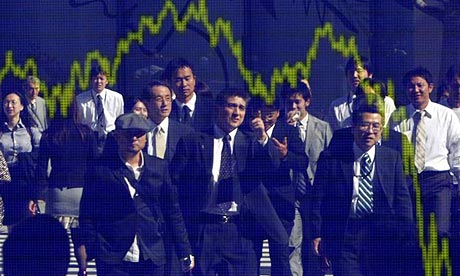- guardian.co.uk, Monday November 17 2008 07.54 GMT
-
 larger | smaller
larger | smaller - Article history

A stock quotation board outside a brokerage in Tokyo. Photograph: Toru Hanai/Reuters
Japan today felt the full force of the global slowdown as its economy slid into recession for the first time in seven years amid weak exports and falling corporate investment.
The world's second-biggest economy contracted 0.1% in the July-September quarter, the government said today. The figures were worse than expected; economists had predicted Japan would narrowly avert recession with growth of 0.1%.
Despite that, the Nikkei gained 0.7%, or 60 points, to close at 8522. Earlier in the day the index gained almost 3% after a slightly weaker yen lifted exporters. The dollar later slipped against the yen, wiping out most of the day's gains.
Two consecutive quarters of contraction - the technical definition of recession - means Japan joins the eurozone countries on the list of major economies in recession, with the US expected to confirm soon that it has met the same fate.
Today's figures mark the first time that Japan has suffered two consecutive quarters of contraction since 2001.
According to government figures, gross domestic product [GDP] contracted at an annualised rate of 0.4%, highlighting its export-led economy's vulnerability to slowdowns in the US and Europe.
Officials warned that a killer combination of slow exports and weak business investment at home meant it could be some time before Japan climbs out of its slump.
"The downtrend in the economy will continue for the time being as global growth slows," said the economy minister, Kaoru Yosano.
"We need to bear in mind that economic conditions could worsen further as the US and European financial crisis deepens, concerns over economic downturn heighten and foreign exchange markets make big swings."
The latest figures come only months after Japan's leaders were praising their economy's fortitude in the face of financial meltdown in the rest of the developed world.
Now, however, Japan can no longer claim immunity. The Nikkei stock average has fallen by 25% since the start of October and the yen's rapid appreciation against the dollar has battered earnings among the country's major exporters.
Toyota, for example, cut its full-year profit forecast by almost 70%. Other car and electronics makers have issued similarly dismal forecasts.
Fears are rising that the Japanese economy will contract again in the third and fourth quarters. The spectre of deflation has also returned as personal consumption, which accounts for 55% of Japan's GDP, threatens to dip following a 0.3% rise last quarter.
Economists put that tiny jump down to the long hot summer and demand for wide-screen TVs ahead of the Beijing Olympics. But consumers are expected to dramatically rein in spending as the full extent of the global crisis becomes apparent on this side of the Pacific.
Given that the latest figures did not factor in the crisis's full impact on Japan, the slump is expected to continue into next year, when the benefits of government stimulus packages finally kick in.
Yosano admitted that Japanese firms were "taking a step back" in terms of capital spending. He added: "As for external demand, we can't expect much from the US, Chinese, European and south-east Asian economies."
Business investment - along with exports the driving force behind Japan's recovery from 2002 - fell 1.7% in the three months from July, the biggest drop in more than a year and its third straight quarterly decline.
The Bank of Japan, which last month cut its key interest rate from 0.5% to 0.3%, could come under renewed pressure to take rates back to zero, although analysts see little point in doing so now.
"It's too late for monetary policy to revamp the economy," said Kyohei Morita, chief economist at Barclays Capital Japan. "The economy needs to depend on fiscal policy."
- guardian.co.uk © Guardian News and Media Limited 2008

No comments:
Post a Comment